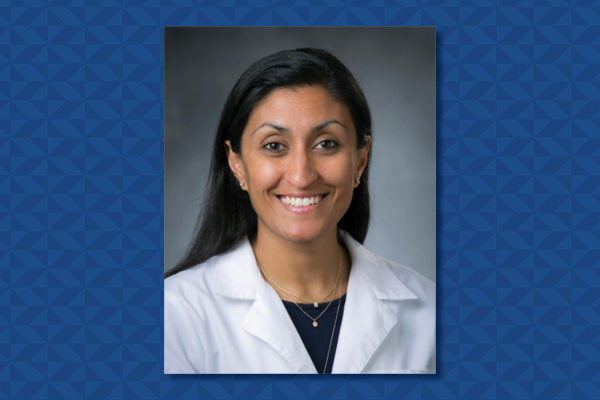
Neha Pagidipati, MD, MPH, associate professor in the Division of Cardiology, is working to improve care fragmentation and inspire the next generation of researchers. She’s a cardiovascular prevention specialist dedicated to finding therapies that work for all patients through her combined interests of public health and clinical medicine.
“Obesity, diabetes, hypertension, and high cholesterol are just some of the factors that contribute to heart disease, and I enjoy helping people manage those aspects on an individual basis by lifestyle modification and using effective medications. But I also really enjoy thinking about how to improve those risk factors on a population level,” Dr. Pagidipati said. Heart disease is the leading cause of death in the United States.
She is one of several providers that treats patients through Duke’s Cardiometabolic Prevention Clinic. “It’s a multidisciplinary clinic that aims to provide coordinated care to the highest risk and most complex patients in the health system,” Dr. Pagidipati said. The team is comprised of cardiologists, endocrinologists, hepatologists, and nephrologists.
“This is practicing medicine the way all of us want to practice medicine. We get to work together with other clinicians and take care of patients in the best way possible,” she said. They refer and coordinate with each other often to prevent vulnerable patients from being overlooked. “Patients who have multiple cardiometabolic issues tend to see many different providers, and that care can be very fragmented, which is worse quality care,” Dr. Pagidipati said. But it also poses a problem for patients themselves.
“They’re just one person trying to manage all of their issues. But they're going to many different clinicians who may or may not be telling them the same thing,” she said.
Dr. Pagidipati helped build the program which patients have been able to access through a variety of Duke clinics, including the South Durham Clinic, for the last eight years. “Having providers practice in different clinics is helpful because some locations are more convenient for patients than others,” she said.
“I think I always knew I wanted to be a physician,” Dr. Pagidipati said. Both her parents were doctors, and that exposed her to medicine early. She briefly considered other career paths, but a trip to India during her sophomore year in college confirmed her decision to pursue medicine.
“After doing public health work there and studying cardiovascular disease prevention in women, I realized health care was something that I was meant to do,” she said.
Dr. Pagidipati fell in love with cardiology as a fourth-year medical student at Harvard University School of Medicine after doing a cardiology critical care unit rotation at Brigham and Women’s Hospital. “It was the first time in my life that I remember thinking, ‘I would actually pay to be allowed to work every day in the CCU,” Dr. Pagidipati said.
It’s also where her interest in women’s health broadened and her desire to improve maternal health outcomes deepened. “Cardiovascular disease is the number one killer in women, just as it is in men, yet heart disease in women tends to be under-recognized and undertreated,” Dr. Pagidipati said.
Addressing that is another part of what drives her to improve care for her patients. “There are aspects to women's cardiovascular health that are different from the cardiovascular health in men that need additional focus and research,” Dr. Pagidipati said.
After graduating from medical school, she completed Brigham and Women’s Hospital Internal Medicine Residency and Global Women's Health Fellowship Program’s and earned a Master of Public Health from Harvard University.
Dr. Pagidipati has remained at Duke’s School of Medicine since completing a cardiology fellowship in 2017. “A critical piece of staying in an academic center is growing the next generation of investigators and clinicians,” she said. While mentorship isn’t something she set out to do, it’s become a large part of her life.
“The single most rewarding thing about being a doctor is taking care of patients. It’s an integral part of who I am, but I absolutely love and value the research and education aspects as well,” Dr. Pagidipati said. She was selected as an Associate Program Director of the Duke Clinical Research Institute Fellowship Program in 2018.
“It’s becoming increasingly harder to become a researcher, and we need people going into research because our medical enterprise doesn't work without them,” she said. “I enjoy fostering that interest and teaching trainees that it can be done successfully and in a way that gives them a balance in their lives and clinical work.”